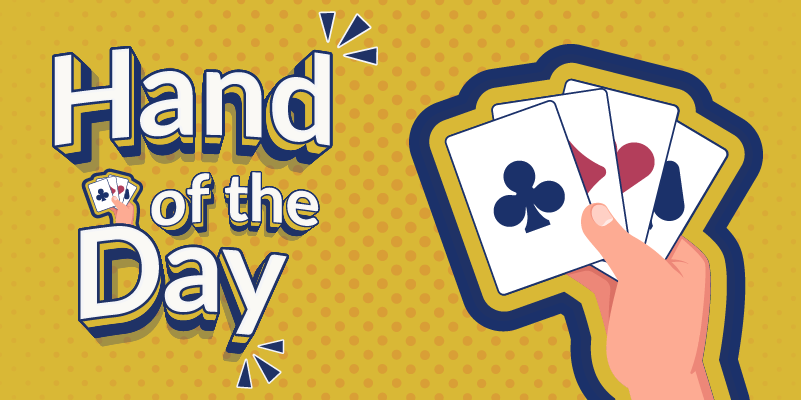


If you are playing for IMPs, the result is determined by comparing your score on each deal with that of your opponents, the difference being translated into IMPs. On any given deal the maximum number of IMPs you can win is 24. To achieve that you need a difference of 4000+ points! It doesn’t occur very often, but in this month’s article, Larry Cohen shows you how it can happen.
In the 2001 U.S. Team Trials, I held this ordinary-looking hand:
♠ QJ4
♥ AJ987
♦ 1098
♣ 53
Vulnerable against not, my partner, David Berkowitz, opened 1NT. Our range is 14-16. My first move was easy, I bid 2♦ which we play as a “relay” to 2♥. Partner was forced to bid 2♥ and I had a decision. Should I invite game (via 2NT)? My spots were excellent, and vulnerable at IMPs it pays to bid aggressive games. But, as we accept with most 15’s, I didn’t want to reach game with two balanced hands totalling only 23HCP. So, I passed.
My expert LHO balanced with 3♦. I was planning on doubling this, but David continued with 3♥. Now, I knew he had a good hand for Hearts (after all, he bid 3♥ vulnerable when I could have had five small Hearts and nothing else). There was also a good chance he had only a doubleton Diamond, which would fit well with my hand (picture, for example: ♠K963 ♥KQ62 ♦43 ♣AK4, and game is superb).
So, I raised to 4♥. The opponents had “balanced us into game.” This isn’t a normal occurrence in expert circles. The auction wasn’t over. My LHO doubled 4♥ and my partner redoubled! This was the full deal:
Larry is sitting North and David South
Notice that East-West would have done well to sacrifice in 5 Clubs doubled, which probably goes down only two (-300). Against 4 Hearts redoubled, West led his singleton Diamond, to dummy’s 10, East’s Jack and David’s Ace. With the aid of the Heart finesse, David drew trumps and knocked out the ♠A. He threw one of dummy’s Clubs
on his Spades and eventually picked up the Diamonds
to make twelve tricks! What’s the score for 4 Spades redoubled vulnerable with two overtricks? An astounding +1880. Our teammates were -680, and we won 15 unusual (undeserved?) IMPs.
One of my favourite stories in bridge was when a player replied “Lose ’em all” during a score comparison. Here was a recurrence from the 2007 National Open Swiss Teams. Kit Woolsey held:
♠ 2
♥ AQJ1065
♦ -
♣ A107654
With both sides vulnerable, RHO opened 1♠ and Kit tried 2♠, Michaels’. LHO bid 3♦ (natural) and RHO bid 3♠.
Kit now bid 4♥, which was doubled. His partner, Fred Stewart, redoubled. This was supposedly for rescue(*), but Kit stuck it out. This was the full deal:
Fred is sitting North and Kit South.
West led the ♠Q and continued the suit. Declarer played the ♥A and the ♥Q in an attempt to make his contract (on 4-2 or 3-3 Hearts). Disaster! West was in control. He played Diamonds every time he was in and declarer was held to only his five natural trump tricks. Down 2800!
At the other table, East opened 4♠, South bid 4NT, takeout, West raised to 5♠. North bid 6♣ and East doubled. Declarer had no trouble making this for +1540 to go with 2800 from his teammates. Kit was ready for the score comparison. When his teammates read off “minus 1540,” the reply was “Lose ’em all.”
This is a wild deal from the 2007 New Orleans Regional. With both vulnerable, I held:
♠ KJ9764
♥ Q5
♦ K64
♣ 96
I opened 2♠ which was passed around to RHO. He balanced with 2NT. This should show a No-Trump hand, Spades stopped, and about a King less than a direct No-Trump overcall (so, maybe 13-15). If you’ve ever taught bridge, you have to make sure your students know all the meanings
of 2NT in competition (it is easy to confuse natural with takeout and to have general confusion over the ranges). After the 2NT call, my LHO bid 3♦ to transfer to Hearts. RHO rejected and bid 3NT (probably never such a good idea on this auction). This was passed around to my partner, Steve Weinstein. He doubled and everyone passed. What should I lead?
Such doubles typically show dummy’s suit, so I led the ♥Q. This was the full deal:
Larry is sitting West and Steve East.
As you can see, declarer did a lot of bidding. I can live with 2NT (yes, I see the singleton, but it was an honour). After the transfer, I think I might have tried passing! How bad could it be to play in 3 Diamonds? Anyway, back to the carnage. The ♥Q held and I played another Heart to partner. He played the ♠8 through declarer. Possibly shocked by the events so far, declarer made the poor play of the ♠A.
He tried to cross to dummy to take a Diamond finesse. His play of a Club was not a success. Steve won and played his other Spade. I took five Spade tricks and played another Club. In all, we took nine black winners and three Heart tricks for down eight, plus 2300!
Could declarer have done better? Of course. But not much better. Even on best play, all he can get is his two Aces! Say he plays low on the Spade return at trick three. Now, I cross in Clubs for another Spade play. My Spades are set up and I have the ♦K as an entry. We can take eleven tricks on defence for +2000. After the hand, declarer apologized, but his best technical comment would have been, “Sorry pard, I could have held it to down 7.”
At the other table it went 2♠-Pass-Pass-Pass, making 4 and we won 19 IMPs. Although this wasn’t the maximum swing (24), it certainly reminded me of Lose ’em all.
(*)No, I don’t understand why North wouldn’t bid 4NT to ask partner to choose a minor, and no, I don’t understand why the partnership wouldn’t presume South held Clubs (since West bid Diamonds).
This article was written by Larry Cohen and was originally published in Bridgerama+.




Excellent stories
Well, on first deal, it seems normal to me, vulnerable to go 2N with such nice hand. Besides, why didn't Steve go 3 Clubs instead of transfering to 2 Hearts? Perhaps only Marty does this, but should be routine when the player masters the Law, as I imagine Steve does. Undeserved? Perhaps so, but at least you seized the opportunity, later in the bidding.